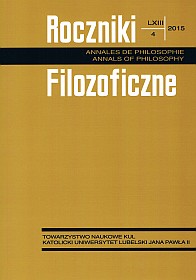The “Logic” of Aristotelian Causality: An Analysis of the Genesis of Artifacts
Abstract
The present paper, taking as a point of departure Aristotle’s dispute with the ancient physicalists in Physics II.8–9 about the role of the final cause in nature, examines the context of the problem, his theory of the causes. Aristotle assumes an analogy between nature and craft and takes the production of artifacts to be paradigmatic. With these assumptions as guiding principles, the paper attempts to motivate his causal theory and propose what may be called a “logic” of the causes. It examines artefactual coming-to-be more closely, focusing on the aspects of Aristotle’s account that are highlighted in his explanation of natural coming-to-be: the basic character of the causes, the peculiar distinction between the causes and the accompanying the deeper coincidence among three of them, the complementarity between the final and moving causes, the nature and role of desire in coming-to-be, and the primacy of form. It introduces the notion of a trans-temporal objective whole and shows the need to consider the full whole—which includes the entire process of coming-to-be together with its source—as the proper context for a full understanding of coming-to-be. It also points out the importance of the distinction between the objective and subjective perspectives, especially useful in understanding final causality.
References
Apostle, Hippocrates G., trans. Aristotle’s Physics. Translated with Commentaries and Glossary. Grinnell, Iowa: Peripatetic Press, 1980.
Balme, David M. “Greek Science and Mechanism, I: Aristotle on Nature and Chance.” The Classical Quarterly 33 (1939): 129–138.
Barnes, Jonathan, trans. The Complete Works of Aristotle: The Revised Oxford Translation. 2 vols. Princeton: Princeton University Press, 1991.
Charlton, W., trans. Aristotle’s Physics, Books I and II, with Introduction and Notes. Oxford: Clarendon Press, 1970.
Cooper, John M. “Aristotle on Natural Teleology.” In Language and Logos, ed. Malcolm Schofield and Martha Craven Nussbaum, 197–222. Cambridge: Cambridge University Press, 1982.
Descartes, René. Discourse on Method. In Discourse on Method and Meditations on First Philosophy, trans. Donald Cress. Indianapolis, Indiana: Hackett Publishing Company, 1980.
Friedman, Robert. “Matter and Necessity in Physics B 9 200a15–30.” Ancient Philosophy 3 (1983): 8–11.
Gotthelf, Allan. “Aristotle’s Conception of Final Causality.” Review of Metaphysics 30 (December 1976): 226–254. Reprinted, with a postscript, in Philosophical Issues in Aristotle’s Biology, eds. Allan Gotthelf and James Lennox, 204–242. Cambridge: Cambridge University Press, 1987.
Gotthelf, Allan and James Lennox, eds. Philosophical Issues in Aristotle’s Biology. Cambridge: Cambridge University Press, 1987.
Han, Hilde. “Molecular Biology vs. Organicism: The Enduring Dispute Between Mechanism and Vitalism.” Synthese 20 (1969): 238–253.
Lear, Jonathan. Aristotle: the desire to understand. Cambridge: Cambridge University Press, 1988.
Lennox, James. “Teleology, Chance, and Aristotle’s Theory of Spontaneous Generation.” The Journal of the History of Philosophy 20 (1982): 219–238.
Meyer, Susan Sauvé. “Aristotle, Teleology, and Reduction.” Philosophical Review 101.4 (1992): 791–825.
Nussbaum, Martha Craven. “Aristotle on Teleological Explanation.” In Aristotle’s De Motu Animalium, Text with Translation, Commentary, and Interpretive Essays, Martha Craven Nussbaum, 59–106. Princeton: Princeton University Press, 1978.
Papineau, David, Thinking about Consciousness. Oxford: Clarendon Press, 2002.
Preus, Anthony. “Aristotle’s Natural Necessity.” Studi Internazionali di Filosofia 1 (1969): 91–100.
Ross, William D. Aristotle. London: Routledge, 1995.
Sorabji, Richard. Necessity, Cause, and Blame. Perspectives on Aristotle’s Theory. Ithaca, N.Y.: Cornell University Press, 1980.
Waterlow, Sarah. Nature, Change, and Agency in Aristotle’s Physics. Oxford: Clarendon Press, 1982.
Watson, J. D. The Molecular Biology of the Gene. (1st ed.) New York: W. A. Benjamin, 1965.
Copyright (c) 2015 Roczniki Filozoficzne

This work is licensed under a Creative Commons Attribution-NonCommercial-NoDerivatives 4.0 International License.





